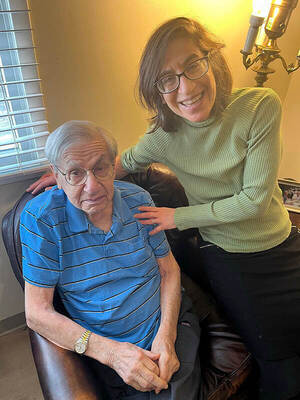In memoriam: Barth Pollak, professor emeritus of mathematics

Barth Pollak, professor emeritus of mathematics at the University of Notre Dame, died Feb. 17 in Brookline, Massachusetts. He was 94.
Born and raised in Chicago, Pollak earned his bachelor’s and master’s degrees in mathematics from the Illinois Institute of Technology (IIT). With a fellowship from the National Science Foundation, he received his doctorate from Princeton University, and then served on the mathematics panel of the Scientific Advisory Board for the National Security Agency.
Pollak then served on the mathematics faculties at IIT and Syracuse University before coming to Notre Dame in 1963, where he spent 37 years teaching and conducting research on arithmetic theory of quadratic forms, classical groups and algebraic number theory.
“Barth and I were colleagues and friends for six decades,” John Derwent, associate professor emeritus of mathematics, said. “He loved mathematics and teaching and hated administration. Most of all he loved his wife, Helen, and his children Martin and Eleanor, both of whom have had distinguished careers in medicine.”
Pollak received the Rev. James L. Shilts, C.S.C./Doris and Gene Leonard Teaching Award from the College of Science in 1993 for excellence in teaching at the undergraduate or graduate level.
Pollak was preceded in death by his wife and is survived by his son and daughter, their spouses and two grandsons. An online service in celebration of his life will take place this spring.
In lieu of flowers, the family requests memorial donations in Pollak’s honor be made to Math Circles of Chicago.
Latest Faculty & Staff
- In new research, Roy Scranton explores climate change and the limits of human progressIn his most recent book, “Impasse: Climate Change and the Limits of Progress,” Scranton, an associate professor of English, defines the impasse he sees as “not only political and institutional, but cognitive, existential and narrative” and asserts that the only path forward is through embracing what he terms ethical pessimism. “A lot of people confuse pessimism with nihilism, apathy and despair,” Scranton said. “But pessimism is actually about recognizing our limits, letting go of unrealistic goals, finding solidarity in the fact of human suffering and doing what you can now, not in some utopian future.
- Joule Bergerson, energy technology assessment expert, named new director of ND EnergyND Energy faculty director Joule…
- In memoriam: Alasdair MacIntyre, the Rev. John A. O’Brien senior research professor of philosophy emeritusAlasdair MacIntyre, the Rev. John A. O’Brien senior research professor of philosophy emeritus and a permanent senior distinguished research fellow at the de Nicola Center for Ethics and Culture, died on May 21, 2025. He was 96.
- Santiago Schnell, dean of Notre Dame’s College of Science, appointed as provost of DartmouthSantiago Schnell, the William K. Warren Foundation Dean of the College of Science at the University of Notre Dame, has accepted an appointment as provost at Dartmouth College. He will depart Notre Dame at the end of June and begin his new role in July.
- Notre Dame’s Fightin’ Irish Battalion receives Department of Defense award as nation’s top Army ROTC programThe United States Department of Defense honored the University of Notre Dame’s Army ROTC Fightin’ Irish Battalion as the nation’s top Army collegiate program for the 2023-24 academic year. This will be the first time the unit has received the department’s Educational Institution Partnership Excellence Award, which recognizes the program’s achievements in recruiting, educating, training and commissioning leaders of character to be the next generation of military officers.
- In memoriam: Karl Ameriks, the McMahon-Hank Professor of Philosophy EmeritusKarl Ameriks, the McMahon-Hank Professor of Philosophy Emeritus at the University of Notre Dame, died on April 28 from pancreatic cancer. He was 77. Born in post-World War II Germany, Ameriks’ family emigrated to the United States when he was a child, and he grew up in Detroit, Michigan. He received his bachelor’s and doctoral degrees from Yale University. He came to the Department of Philosophy at Notre Dame in 1973 during a formative time for the department, which had transitioned from a predominantly Thomist focus to the more analytical American philosophy in the 1960s.











